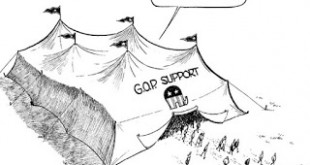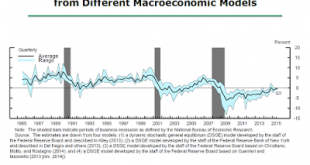A short op-ed in the Wall Street Journal, of all places, suggests that David Card's famous work (subscription required) on the effects of Cuban immigrants on real wages in Miami was probably correct, meaning immigration does NOT depress wages or lead to higher unemployment. Peri and Yasenov's actual paper is available here (subscription is also required, I'm afraid).I do have problems with the mainstream interpretation that real wages and employment are determined in the labor market for...
Read More »A comment on Dean Baker’s comment on Paul Krugman’s comment on Bernie Sander’s Health Plan
Away for while, and back in full meta-post. I guess all posts are comment on another post, this one is just one more degree of separation. So Krugman sides with Hilary over Bernie. Let's extend Obamacare, rather than get Medicare for all. The reason is mainly political calculation. It would be impossible to get a single payer system covering everybody. The power of insurance companies, and pharmaceutical firms, combined with the insidious role of money in the political process, implies that...
Read More »Republican Presidential Debate and Faux Populism
[embedded content]
Read More »On the Job numbers and more at the Rick Smith Show
[embedded content]
Read More »Political Aspects of Unemployment: Brazil’s Neoliberal U-Turn
New paper by Franklin Serrano and Luiz Eduardo Melin. From the abstract: Throughout the world, the reversion of fortune suffered by the Brazilian economy since reaching its zenith as recently as 2010 has confounded shrewd commentators, seasoned analysts and market players alike. As 2015 unfolded, ominous projections (“An Economy on the Brink”, “Brazil’s Economy Falters” “Worse May Be To Come”) were no less widespread than expressions of bewilderment (“Whatever Happened to Brazil”, “Brazilian...
Read More »The strange and misunderstood reasons for the Brazilian crisis
Almost done for the year. So do not expect many posts before the end of the ASSA conference (January 5). But as I promised, here are some brief thoughts on the Brazilian crisis.Brazil is a mess. The economy is collapsing, with an estimated decline of about 3.5% in GDP this year (perhaps worse), and inflation has accelerated, to two digit levels, way above what used to be the upper limit of the inflation target band. Worse, politically the country is paralyzed, with an impeachment process in...
Read More »The World in 2016 at the Rick Smith Show
[embedded content]
Read More »Neoliberalism Resurgent: What to Expect in Argentina after Macri’s Victory*
The election of businessman Mauricio Macri to the presidency in Argentina signals a rightward turn in the country and, perhaps, in South America more generally. Macri, the candidate of the right-wing Compromiso para el cambio (Commitment to Change) party, defeated Buenos Aires province governor Daniel Scioli (the Peronist party candidate) in November’s runoff election, by less than 3% of the vote.Macri is the wealthy scion an Italian immigrant family that made its money on the basis of...
Read More »Employment report and FOMC decision on the Rick Smith Show
[embedded content]
Read More »Interest rates will go up (almost certain now)
Not a conventional rate Janet L. Yellen said in her speech at the Economic Club of Washington that rates are going to increase. Perhaps there will be no unanimous decision by the FOMC, but gradual increases should start in December. It must be noted that she did say that: "we cannot yet... declare that the labor market has reached full employment." She is also concerned with the weakness of the global economy, and, hence, of US exports. The forecast in a nutshell: "I anticipate continued...
Read More » Naked Keynesianism
Naked Keynesianism


